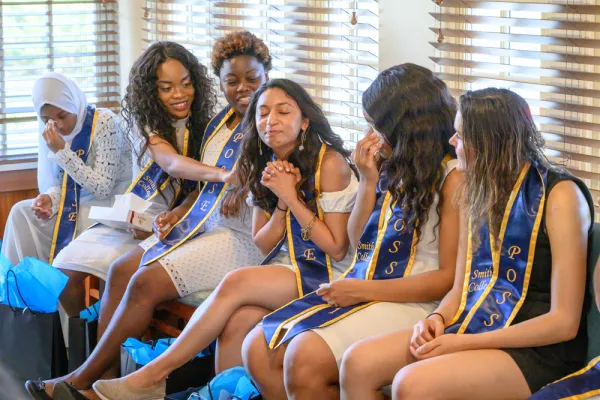Everyone Needs a Posse
Campus Life

Published May 31, 2019
Eleven members of the class of 2019—all from New York City—were recruited together, came to Smith together and supported one another throughout their four years.
It was only fitting that Smith’s first Posse students celebrated the end of their time at Smith with a private gathering the day before the big Commencement ceremony.
In 2014, in conjunction with a White House summit on access to higher education for underserved students, President Kathleen McCartney announced Smith’s partnership with the Posse Foundation, which recruits small, diverse groups—or “posses”—of talented students for specific colleges and universities. The students receive full scholarships and special faculty mentoring, and students in the posse support one another throughout their college careers.
In 2015, Smith welcomed its first Posse STEM Initiative class—11 students selected for their leadership potential and their desire to become STEM majors. All received their degrees with the rest of the class of 2019.
“Posse is here to stay,” said Audrey Smith, vice president for enrollment. “This has been a very successful partnership. The students have done very well academically, and they’ve all assumed meaningful leadership on campus.”
The collaboration between Smith and the Posse Foundation has been so successful that, beginning in 2020, incoming Posse students will not be limited to STEM fields, but will include those who plan to major in the humanities and the arts.
Kate Queeney, chair of the chemistry department, served as faculty mentor to the first cohort, meeting extensively with individual students and the group as a whole. “I’ve learned a lot about what works and doesn’t work for them about Smith,” Queeney said. “It’s changed the way I teach. It’s changed the way I advise.”
Biochemistry major Dinah Nahid ’19, who will start a master’s program in biology at Wake Forest University in the fall, cites support from Queeney and from her posse as crucial to her success. “It’s a full-fledged network meant to help students be successful beyond their academics, from career support to gaining a better understanding of the various issues pertaining to the world at large,” Nahid said. “It encourages us to be more intersectional in our worldview and to try to see things from different perspectives.”